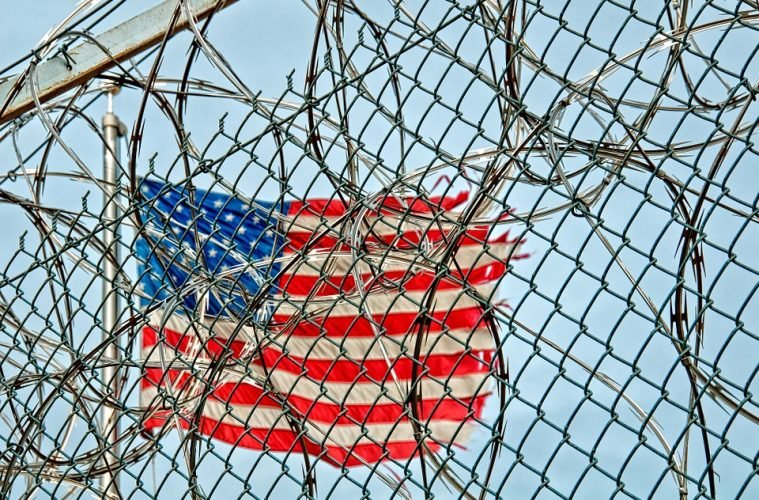Governor Andrew Cuomo's attempt to reform New York's bail system is not a step too far - it's one that doesn't go far enough.

let's face it - it's never been the home of the free. Source
As a New Yorker I’m subject to its laws, as are the majority of my friends and family. When changes to these laws are proposed I tend to take notice, especially when these new laws affect me in some way. It’s happened in the past – as a gun owner (and as someone who definitely does not want to get shot, like, ever), I was affected by the New York SAFE Act when it went into effect in 2013. Likewise, the state’s 2014 Compassionate Care Act opened the door for New Yorkers to seek treatment by way of medical marijuana for certain illnesses – and my wife @alladesria suffers from many of the chronic conditions covered by the law.
The problem with these laws, however, is that there have been gaps between the intent of these pieces of legislation – laws that looks progressive on the outside – and the actual impact of these laws. Unfortunately, not every law as proposed is going to end up providing the benefits it sponsors promise. The SAFE Act, for example, has been subject to major criticisms for its approach to firearms safety by regulating guns in a manner that may not make New Yorkers less likely to be the victims of gun violence. Additionally, Compassionate Care NY’s requirements for becoming a medical marijuana patient are so stringent that it’s often quicker, easier, and less expensive to buy marijuana illegally as a street drug.
An Attempt to Build a Political Legacy
While there’s no one singular unifying cause behind these laws, there is one correlation to be made: all of this legislation occurred while Andrew Cuomo served as governor of New York, and these laws were supported openly by the governor. This is why a lot is going to be said about another attempt to enshrine a law statewide that looks progressive on the outside while having unforeseen negative consequences: Governor Cuomo's push to eliminate bail for certain types of crimes in New York. This is certainly a step in the right direction, as there are some major problems with how the bail system makes it easy for wealthy New Yorkers to literally buy their freedom while penalizing lower-income earners who have to then sit in a holding cell until their court date because they can’t afford to post bail. On a broader scope, though, the proposed law doesn’t deal with the real problem: New York's criminal justice system - and that of the entirety of the United States - revolves around corporate profits built on the back of, effectively, the slave labor of the incarcerated.
The proposed changes to New York’s handling of bail essentially boils down to removing it as an option for certain types of crimes. Instead of having three options – releasing a defendant on their own recognizance until their next court date, remanding them to custody until then, or offering them the opportunity to post bail for their freedom until then – judges will only have the choice between throwing a defendant into a holding cell or letting them walk free. In a perfect world, this system would work sufficiently – defendants deemed too dangerous to be out on the street would be held, safely and securely, in jail, while everyone else would be left to go back to their lives and their homes until their next court date.
A Poorly Thought-Out PR Stunt
The problem with this is that there’s reduced incentive to release defendants on their own recognizance in our current system. The prison industrial complex revolves around privatized prisons profiting off lucrative government contracts, construction companies profiting off the building of countless new jails across the country, and companies profiting by paying pennies a day to inmates forced to make products for them. This means there’s a vested interest to keep jails and prisons filled with as many inmates as possible – and the vast sums of money spent on these endeavors goes not to social services that would prevent individuals from becoming incarcerated but to social control methods that ensure the prison population is kept burgeoning. Meanwhile, institutionalized racism in our court systems means that a disproportionate number of non-whites are incarcerated. The prison industrial complex encourages this to ensure there's a steady stream of "human resources" that it can leverage. Everybody involved in this circle of power wins – and the average New Yorker is not in the circle.
Working to eliminate bail is less of an attempt to reform New York’s criminal justice system and is more of a PR stunt. It’s been obvious for several months, if not years, that Governor Cuomo is undoubtedly looking for high-profile wins that he can put in his column as he considers a presidential run. This is likely part of why he’s been a tireless cheerleader for medical marijuana and gun safety, as he can then use these “accomplishments” to prove he has the progressive pedigree needed to run for US president, even though his headline-grabbing solutions only create more problems on a practical level. Governor Cuomo is trying to repeat this “success” by addressing a single problem with the state's criminal justice system that will likewise grab the headlines.
The Bail Problem is a Race (and a Class) Problem
But the bail problem is just a symptom of a much larger disease - institutionalized racism within the courts of New York. There's an obvious racial bias against people of color in New York. By the governor's own admission, 86 percent of the people in New York City jails are either African Americans or non-white Latinos. This means that the remaining 14 percent of people in city jails are some mix of white, Asian, and whatever other races make up the city. Meanwhile, the overall population of New York City, according to independent research, is over 44 percent white. This raises the very real question: why are there not more white people in city jails?
Are non-white New Yorkers are being discriminated against, even targeted, by the state's judicial system? There have always been accusations when it comes to institutionalized racism in this manner, and there's evidence to back up claims that non-whites are treated unfairly. Non-white Americans are arrested more often, offered less desirable plea agreements, and spend more time in jail than white Americans on average; judges may be contributing to this discrimination against non-whites by assigning unconscionably high bail judgments against them while white defendants receive more lenient judgments. This is almost certainly one of the many reasons why there are a disproportionate number of non-whites in New York City jails.
Overall, the lowest income New Yorkers tend to be non-white. With the bail system in place, these non-white low-income earners have little to no practical options – they can either languish in a holding cell until their court date, or they can attempt to enlist the aid of a bail bondsman. This latter choice is fraught with the potential for abuse - the bail bonds agency industry is of course part and parcel of the prison industrial complex after all, as at its core it’s nothing more than a human resources funnel to keep the courts supplied with poor, non-white defendants that can be shipped off to the closest privately-owned prison where they’ll be put to work for little to no compensation.
Reading In Between the Lines
It’s important to note that many bail bond agency organizations are vehemently opposed to the dismantling of the bail system in New York. This is no surprise, as this would eliminate the ability for these agencies to turn a profit through institutionalized enslavement; criminal justice reform that involves restructuring the bail judgment system is taking things too far. Ironically, this same restructuring is bad news, not because it goes too far, but it doesn’t go far enough: with evidence that the state's criminal justice system treats non-white defendants badly by apprehending, prosecuting, and sentencing them more harshly and more often than white defendants, how can we trust that these same judges who assign insanely high bail judgments to poor non-whites today will decide in favor of these same individuals when it comes to deciding between jail time and walking free?
The prison-industrial complex spreads farther than just New York, of course. For decades the entire country has been gripped by this voracious need for as many prisons – and prisoners – as humanly possible. Reforming the bail system in New York, while on the outside has the most noble of intentions of keeping more people out of prison, is unlikely to accomplish that goal because of the grip the prison-industrial complex has on the state and the country. Sadly, with the truly vast amounts of money changing hands, there’s little to no chance that this arrangement will change in the near future. Unless people come together to institute real change by dismantling this system through protest, change, and social unrest – unless we can become loud enough so that the government can no longer ignore the tumult – it won’t matter how many presidential hopefuls propose legislation that attempt to change the legal landscape. Until we address the inequalities that the rich and powerful have created, there will never be anything approaching real justice for those who deserve it.
Like what you've read? Don't forget to upvote and resteem!
